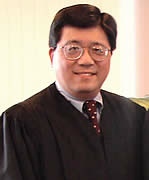

.org

One factual correction: we pled to 4,300 plants, not 6,000.
Enjoy,
Peter
---------------------------
New York Times
November 21, 1999
Case Involving Medical Use Of Marijuana Results in Plea
Two advocates of the medicinal use of marijuana pleaded guilty today to
growing more than 6,000 plants and selling the drug, saying their only hope
was to ask for a judge's mercy after they were precluded from raising
medical issues in their defense.
The two men, Peter McWilliams and Todd McCormick, intended to tell jurors
about the state law passed by voters in 1996 allowing marijuana use for
medical purposes, its purported benefits and their own health. Mr.
McWilliams has AIDS, and Mr. McCormick has fused vertebrae from childhood
cancer treatments.

But Judge George H. King of Federal District Court here barred them from
raising those issues in the courtroom after prosecutors contended that doing
so would confuse and mislead jurors.
At the heart of the dispute was whether a ''medical necessity defense''
saying they broke the law because their health required it could be used
when Congress had classified the drug in question as having no legitimate
use.
''Given the judge's logic, that the medical necessity defense does not
exist, someone in Peter's situation has only two remedies to prevent him
from going to jail,'' said Tom Ballanco, a lawyer for Mr. McWilliams.
''One is prosecutorial discretion, and the other is compassion on the part
of the judge,'' Mr. Ballanco said. ''Here, obviously, the prosecutors chose
to prosecute, so it's all up to the judge to demonstrate there is some
compassion in the federal law. I am hoping that he will.''
Both pleaded guilty to charges of conspiring to manufacture and distribute
marijuana. In doing so, they capitulated to a set of facts that they
continued to dispute outside the courtroom. Based on letters Mr. McCormick
wrote to Mr. McWilliams, prosecutors maintained the men were planning to
sell marijuana to cannabis clubs where ill people go to use the drug.
But the defendants maintained they were growing the plants for personal use
and for a book Mr. McCormick was writing about medical marijuana. Mr.
McWilliams, a book publisher, acknowledged growing 300 of his own plants but
insisted the roughly $100,000 he gave Mr. McCormick was a book advance, not
financing for the growing operation.
The case also highlighted a conflict in federal law. Despite Congress's
stance, the United States Court of Appeals for the Ninth Circuit allowed a
cannabis club in Oakland to resume providing marijuana to patients in
September, saying medical necessity could be used as a defense against a
court injunction obtained by the Clinton administration.
Mr. McWilliams, who faces up to five years in prison under his plea, waived
his right to appeal on that issue. But Mr. McCormick will appeal Judge
King's ruling on the medical necessity defense. If he loses, he will face
five years in prison.
''I felt this was the smartest way to protect my health and my well-being,''
Mr. McCormick told reporters outside court afterward.
| His Life |
| from the NY Times |
| past news |
| Buy Books from Us |
| Been There, Done that, Got Our T Shirt! |
| Oh Goody! Here's my Hoodie! |
| A Batch from the Past |
| Quotes |
| Poetry |
| Peter and Computers |
| Personal Growth |
| Luxury of a Negative Thought Main Page |
| How to Survive the Loss of a Love |
| Peter's Photography |
| Ain't Nobody's Business |
| LIFE 102 |
| Kodak Moment Quotes |
| Peter's Poems: Through the Years |
| Cards |
| Valentines |
| Handwritten Poetry |
| Journal Entries |
| Computer Articles |
| computer books |
| Computer Book Reviews |
| Newsweek Dec. 21, 1987 |
| TIME Magazine Jan. 24, 1983 |
| People Weekly Sept. 19, 1983 |
| Luxury Quotes |
| Excerpts from LIFE 102 |
| Author's Notes |
| Peter's Letter (Life 102) |
| Peter Trial: Latest News |
| Checklist for Depression |
| Peter Mail |
| Can't Use MMJ as Defense |
| Drug Laws Kill |
| I, Too, Have a Dream (August 3, 1998) |
| Libertarians Remember Peter |
| Pocono Libertarians Memorial |
| Peter in Action |
| Peter's Poetry |
| Radio Interviews |
| visits with our friends |
| Peter vs. John-Roger |
| Your Story |
| sharing stories |
| Contact Us |